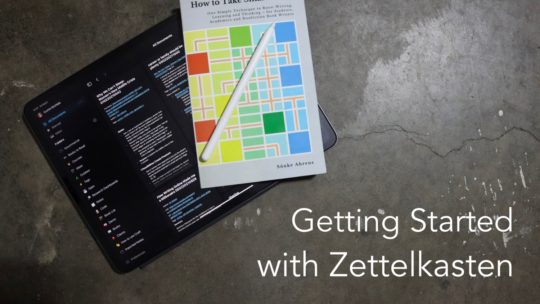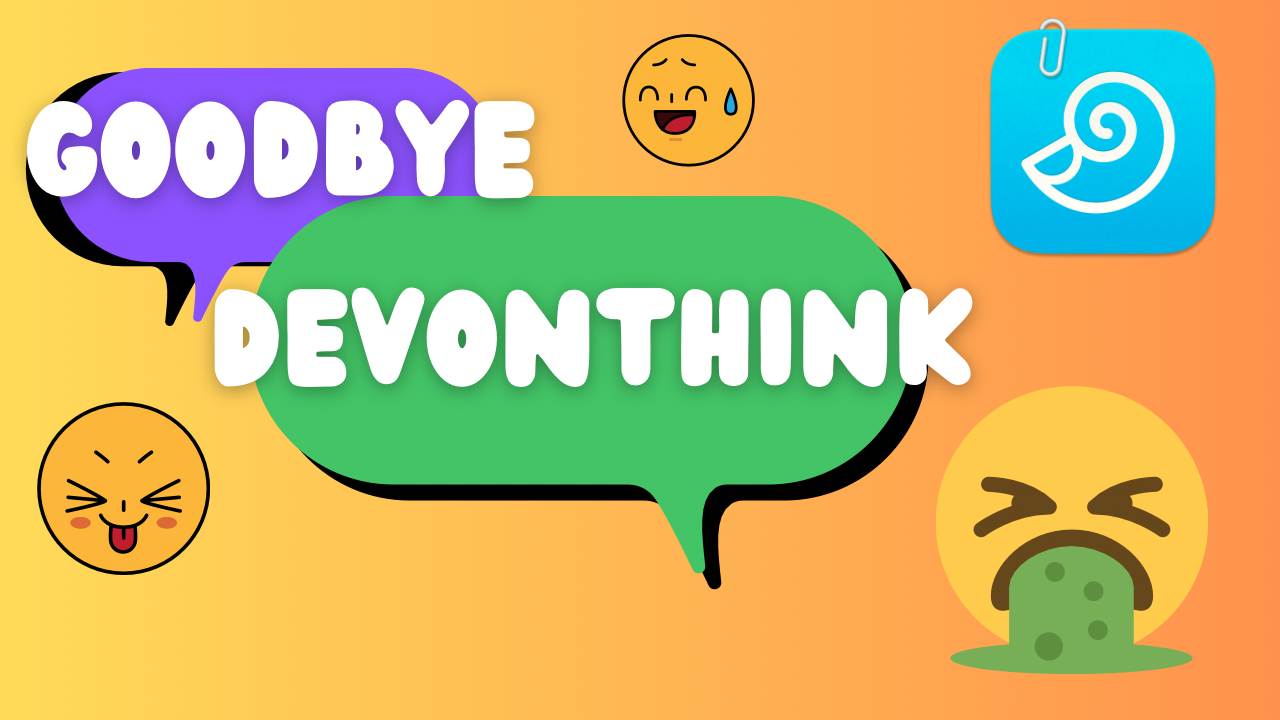Now that I have a Fedora Linux laptop to do my work on I’m realizing that I have some vendor lock-in I need to deal with in my note-taking system. Specifically, I’ve used DEVONthink as my storage for research materials and “other people’s thoughts” for a long time. DEVONthink is not available on Linux though so if I want to look at my backlog of things to summarize, I can’t do that when I’m out and about on my laptop.
What I Currently use DEVONthink for
I have a few uses for DEVONthink. First, it stores any web pages, PDFs, and stuff that I want to read later. I don’t use services like Instapaper or Pocket, I just send stuff to DEVONthink and read it when I get to it. I do this because it removes a step later if I read something, then want to save it and take notes on it. I can link directly to the location of the file in DEVONthink in my Obsidian note and just have it.
When I used to use read later services, I’d find stuff to take notes on and then later when I tried to go back to the content some of it would be gone from the internet. It happened enough, that I just want copies of things.
The second thing I use DEVONthink for is to store manuals for things we own in the house, including Lego instructions. I just want PDFs of this so I can refer to it from my phone or my iPad…or whatever device I’m sitting at.
The third use I have for DEVONthink is to store all my business receipts in digital form so that I don’t have to store paper.
While a single app doesn’t have to do all these things, given the fact that DEVONthink does all these things I’d prefer to stay as close to my current workflow as possible.
This video and post was sponsored by Reflect.app. Reflect is an encrypted note system (as in you loose the password and the recovery kit you’re out of luck). Reflect offers quick end-to-end encrypted sync across all your devices. With Reflect you can sync your calendar and meetings notes to your appointments. Looking for Kindle Sync, you’ll find it in Reflect, negating the need for other services to integrate with your note tool. One of the things I love about Reflect is their free to all course on taking notes.
Features I Don’t use in DEVONthink
DEVONthink also has a bunch of features I don’t use, so they won’t make it on my list of things to look for in a new tool.
First, while I have talked about the see also feature and its ability to highlight other articles/content that could relate to what I’m currently looking at, I rarely use this. The feature sounds great, but in practice, I might launch it once a year and I don’t ever remember a time that I saw the relationships generated and thought that it surfaced something I never would have found.
DEVONthink also has the ability to import whole sites and capture RSS feeds. I guess I could use this to archive my own site, but I have nightly backups, and 99% of my crucial content is in Obsidian. I’ve never used the RSS feature as DEVONthink is an okay RSS app, but it’s not amazing. When it comes to filtering the content you’re going to put time into consuming, a huge volume of RSS items just makes it feel like you’re doing something useful, when all you’re actually doing is creating clutter. If I’m going to put an article in my research archive tool, I want to be very selective about it.
With DEVONthink, you can tag content as well. I did this a bit at first, and then since I was tagging things in Obsidian adding more tags to DEVONthink felt redundant. For my receipts, I put them in a folder by year and don’t worry about it anymore. Any article that I’ve saved for research goes in a single research folder. My Obsidian notes on that article has a link directly back to the article and I use that to navigate back to find it. Tagging feels like a step I don’t need to take with my DEVONthink content.
DEVONthink also has the ability to use Wikilinks so it can be used as a complete Zettelkasten system. I’ve always preferred to have one place to put other people’s thoughts, currently DEVONthink, and one place to put my own notes and thoughts…Obsidian.
What I’d Like
The first thing I’d like is something I can include in any current syncable storage I have. DEVONthink works with iCloud Storage, which I likely won’t be able to use because I’m on Linux with one computer. I also have a Synology and could install NextCloud on it to run my own sync server.
Second, I’d like some type of automation. Currently, I have DEVONthink moving any receipts for the current year into the expected folder for me so that I don’t have to sort through them all myself in the DEVONthink inbox. I guess I could live without this feature, but I’d prefer it be available even if I have to write some scripting to make it happen.
Third, it needs to be cross-platform. That means macOS, Linux (Fedora and Ubuntu), and Windows. Platform lock-in sucks so I want to avoid it as much as possible.
I don’t care if I have to pay for the application in some fashion. I paid for DEVONthink and I’m happy to pay for a good tool that fits my needs.
Options
One leading option currently is Zotero. It does all the stuff I need in regard to research storage and according to this forum post I can sync it myself on my Synology over WebDAV. My biggest concern with Zotero is using it to track other PDFs for appliance manuals and lego instructions.
Another option is Joplin. I took a look at Joplin in 2020 when my biggest issue with it was the poor iPad application that was available. While I still like my iPad, I wonder how much I’ll use it for “work” now that I own a laptop again1. Joplin can be synced via NextCloud on my Synology as well.
Open Paper Work is another interesting open-source tool. It provides fuzzy search, and search suggestions and is intended to scan your documents and make them easy to find. It also allows sync with NextCloud or Syncthing or pretty much anything you can turn into a shared folder. I don’t love the look of the interface here, which unfortunately can be said about a lot of open-source software. The other big drawback to Open Paper Work is that it doesn’t appear to be available on macOS.
Paperless NGX is a cross-platform application, but setting it up isn’t for the faint of heart as you need to run it inside a Docker image. This means it’s a web app running on a local server. I manage web servers daily at my job and I really don’t want to get into running another web server to store my PDF documents.
How to Choose a New Application
I’ve already outlined my needs so now it’s time to just try the different applications. I’m going to start with Joplin’s notes by saving a few things into it and trying out some of my workflows.. Then I’ll try Zotero, and see if any of the other applications in my initial search need to be tested.
The biggest thing to remember for anyone choosing a new application is that no app is going to be perfect. I’m going to find things I don’t like about each application so I’m only going to give myself a few weeks to make a decision. Then it’s I’m going to live with that decision. My next few Fridays will be taken up by testing out these apps and doing some research in them to see how they fit my established workflow.
The biggest mistake people make is spending months trying to find a tool because they’re looking for something perfect. In all that time you just wasted you could have got so much work done, even with an imperfect tool.
- I wish the iPad software matched how awesome the hardware is, but it still doesn’t. Stage Manager is fine, but there is so much more that should be done on the platform. ↩

Getting Started with Zettelkasten
If you’ve been wondering about what Zettelkasten is and how to start organizing your notes with this excellent system then this course is for you. I’ll cover the basics of choosing which tool to use, how to take notes, how to deal with linking your notes, and much more. You can also become a member to get all my courses.
$99 USD (30-day guarantee)
